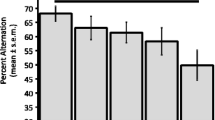Abstract
Rationale
Nicotine receptors in the brain are closely related with memory amelioration induced by cholinesterase inhibitors.
Objective
The present study was undertaken to clarify the role of nicotinic receptors in the ameliorative effects of cholinesterase inhibitors on scopolamine-induced memory deficit.
Method
Drug effects were measured using an eight-arm radial maze with four arms baited. Hippocampal theta rhythm during the radial maze task was also recorded with a polygraph system using a telemetric technique.
Results
Scopolamine (0.5 mg/kg, i.p.) caused a spatial memory deficit as well as an increase in hippocampal theta power during radial maze performance. Pilocarpine, nicotine, physostigmine, and donepezil antagonized the effects of scopolamine. The ameliorative effects of nicotine, physostigmine, and donepezil but not piocarpine on memory performance and hippocampal theta activity were reversed by mecamylamine.
Conclusion
These results indicate that nicotinic receptors have an essential role in the ameliorative effects of cholinesterase inhibitors in both scopolamine-induced memory deficit and the increase in hippocampal theta activity.





Similar content being viewed by others
References
Bejar C, Wang RH, Weinstock M (1999) Effect of rivastigmine on scopolamine-induced memory impairment in rats. Eur J Pharmacol 383:231–240
Chen Z, Sugimoto Y, Kamei C (1999) Effect of intracerebroventricular injection of α-fluoromethylhistidine on radial maze performance in rats. Pharmacol Biochem Behav 64:513–518
Chen Z, Xu AJ, Li R, Wei EQ (2002) Reversal of scopolamine-induced spatial memory deficits in rats by TAK-147. Acta Pharmacol Sin 23:355–360
de Groot J (1959) The rat forebrain in stereotaxic coordinates. Verh K Acad Wet Afd Natuurkd Eerste Sect 52:1–40
Dennes RP, Barnes JC (1993) Attenuation of scopolamine-induced spatial memory deficits in the rat by cholinomimetic and non-cholinomimetic drugs using a novel task in the 12-arm radial maze. Psychopharmacology 111:435–441
Fishkin RJ, Ince ES, Carlezon WA Jr, Dunn RW (1993) D-cycloserine attenuates scopolamine-induced learning and memory deficits in rats. Behav Neural Biol 59:150–157
Levin ED, Rose JE (1991) Nicotinic and muscarinic interactions and choice accuracy in the radial-arm maze. Brain Res Bull 27:125–128
Levin ED, Castonguay M, Ellison GD (1987) Effects of the nicotinic receptor blocker mecamylamine on radial-arm maze performance in rats. Behav Neural Biol 48:206–212
Levin ED, McGurk SR, South D, Butcher LL (1989) Effects of combined muscarinic and nicotinic blockade on choice accuracy in the radial-arm maze. Behav Neural Biol 51:270–277
Levin ED, McClernon FJ, Rezvani AH (2006) Nicotinic effects on cognitive function: behavioral characterization, pharmacological specification, and anatomic localization. Psychopharmacology 184:523–539
Lydon RG, Nakajima S (1992) Differential effects of scopolamine on working and reference memory depend upon level of training. Pharmacol Biochem Behav 43:645–650
Masuoka T, Fujii Y, Kamei C (2006a) Participation of the hippocampal theta rhythm in memory formation for an eight-arm radial maze task in rats. Brain Res 1103:159–163
Masuoka T, Fujii Y, Kamei C (2006b) Effect of scopolamine on the hippocampal theta rhythm during an eight-arm radial maze task in rats. Eur J Pharmacol 539:76–80
Masuoka T, Mikami A, Yasuda M, Shinomiya K, Kamei C (2007) Effects of histamine H1 receptor antagonists on hippocampal theta rhythm during spatial memory performance in rats. Eur J Pharmacol 576:77–82
Masuoka T, Saito S, Kamei C (2008) Participation of hippocampal ionotropic glutamate receptors in histamine H1 antagonist-induced memory deficit in rats. Psychopharmacology 197:107–114
Mikami A, Masuoka T, Yasuda M, Yamamoto Y, Kamei C (2007) Participation of cholinergic system in memory deficits induced by blockade of hippocampal mGlu1 receptors. Eur J Pharmacol 575:82–86
Okaichi H, Oshima Y, Jarrard LE (1989) Scopolamine impairs both working and reference memory in rats: a replication and extension. Pharmacol Biochem Behav 34:599–602
Paxinos G, Watson C (1997) The rat brain in stereotaxic coordinates, 4th-ed. Academic, San Diego
Pereira EF, Reinhardt-Maelicke S, Schrattenholz A, Maelicke A, Albuquerque EX (1993) Identification and functional characterization of a new agonist site on nicotinic acetylcholine receptors of cultured hippocampal neurons. J Pharmacol Exp Ther 265:1474–1491
Samochocki M, Hoffle A, Fehrenbacher A, Jostock R, Ludwig J, Christner C, Radina M, Zerlin M, Ullmer C, Pereira EF, Lubbert H, Albuquerque EX, Maelicke A (2003) Galantamine is an allosterically potentiating ligand of neuronal nicotinic but not of muscarinic acetylcholine receptors. J Pharmacol Exp Ther 305:1024–1036
Storch A, Schrattenholz A, Cooper JC, Abdel Ghani EM, Gutbrod O, Weber KH, Reinhardt S, Lobron C, Hermsen B, Šoškiç V, Pereira EFR, Albuquerque EX, Methfessel C, Maelicke A (1995) Physostigmine, galanthamine and codeine act as ‘noncompetitive nicotinic receptor agonists’ on clonal rat pheochromocytoma cells. Eur J Pharmacol 290:207–219
Sugimoto H, Iimura Y, Yamanishi Y, Yamatsu K (1995) Synthesis and structure–activity relationships of acetylcholinesterase inhibitors: 1-benzyl-4-[(5, 6-dimethoxy-1-oxoindan-2-yl)methyl]piperidine hydrochloride and related compounds. J Med Chem 38:4821–4829
Tani Y, Saito K, Imoto M, Ohno T (1998) Pharmacological characterization of nicotinic receptor-mediated acetylcholine release in rat brain—an in vivo microdialysis study. Eur J Pharmacol 351:181–188
Author information
Authors and Affiliations
Corresponding author
Rights and permissions
About this article
Cite this article
Masuoka, T., Kamei, C. The role of nicotinic receptors in the amelioration of cholinesterase inhibitors in scopolamine-induced memory deficits. Psychopharmacology 206, 259–265 (2009). https://doi.org/10.1007/s00213-009-1603-7
Received:
Accepted:
Published:
Issue Date:
DOI: https://doi.org/10.1007/s00213-009-1603-7




